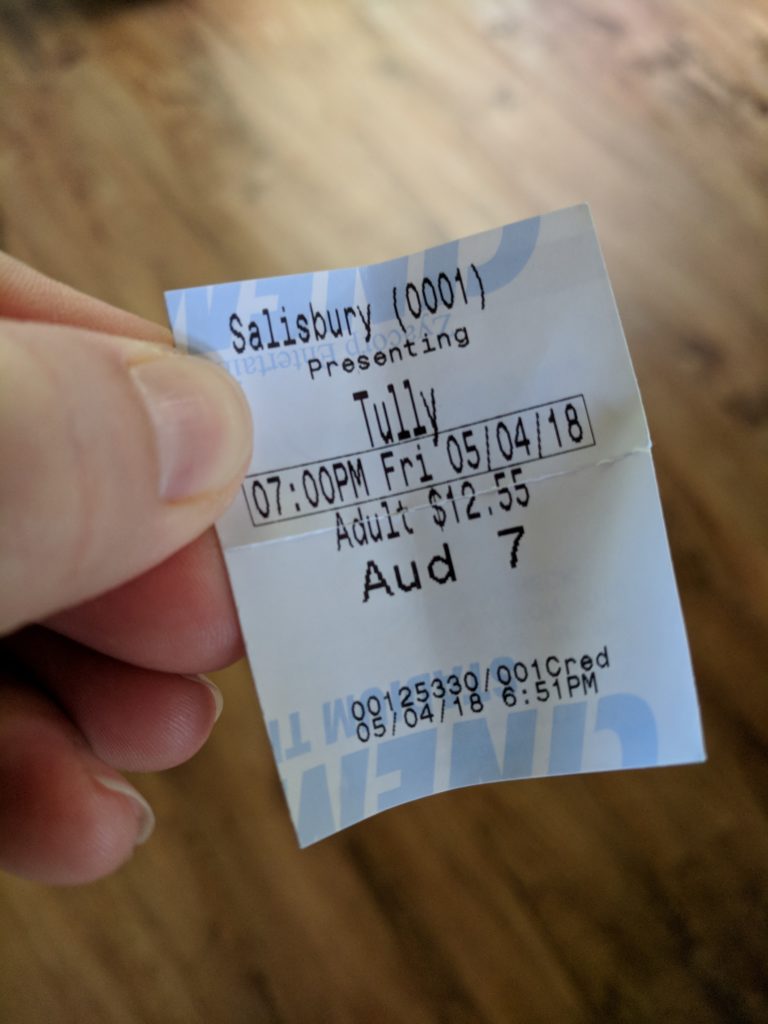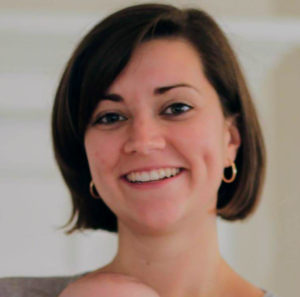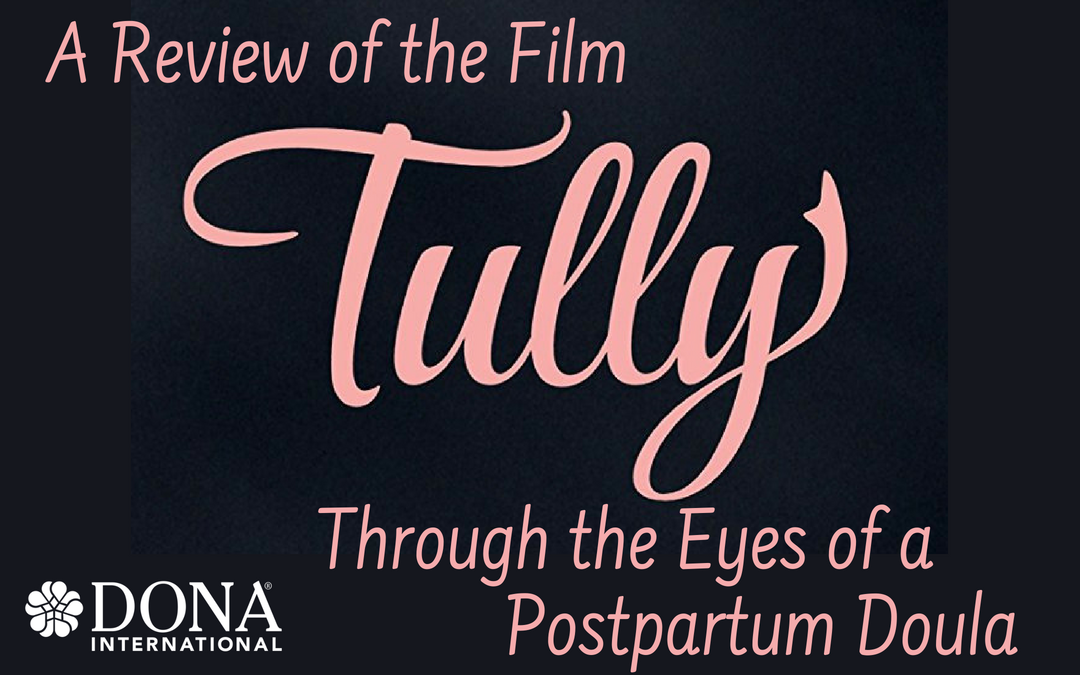Reviewed by Krista Maltais, AdvPCD/PDT(DONA)
Please note: This review may contain movie spoilers and/or plot points.
*While the subject matter involves a night nanny and not a postpartum doula, we are aware that people in many circles unknowingly equate the two roles. DONA International certified postpartum doulas operate within the sphere of our Standards of Practice and Code of Ethics.
Does Tully portray parenthood or postpartum doulas accurately?
This movie broke my heart on so many levels.
As an Advanced Postpartum Doula and Postpartum Doula Trainer, I have spent my adult life providing in-home support, parental education, and newborn care for families during the first twelve weeks after delivery. You can imagine my excitement when I first heard about the movie Tully, written by Diablo Cody and directed by Jason Reitman. The online buzz and speculation in various doula groups was promising; after all, it was “from the people who brought you Juno and Young Adult” – critically acclaimed movies – and was said to be about “motherhood in 2018” with Charlize Theron portraying Marlow, exhausted mother of three, who is gifted a night nanny named Tully, played by Mackenzie Davis.
 I watched a few trailers; with quirky upbeat music, they humorously depicted scenarios almost every new parent can relate to – frozen pizza, pumping breastmilk, marital stress, and sleep deprivation. I was cautiously optimistic at the portrayal of Tully’s character as the night nanny until February when I read Owen Gleiberman’s review in Variety. Gleiberman uses the term “postpartum doula” in the same paragraph as “volunteers to spice up Marlo’s sex life by sleeping with her husband” and thus the breaking of my heart began.
I watched a few trailers; with quirky upbeat music, they humorously depicted scenarios almost every new parent can relate to – frozen pizza, pumping breastmilk, marital stress, and sleep deprivation. I was cautiously optimistic at the portrayal of Tully’s character as the night nanny until February when I read Owen Gleiberman’s review in Variety. Gleiberman uses the term “postpartum doula” in the same paragraph as “volunteers to spice up Marlo’s sex life by sleeping with her husband” and thus the breaking of my heart began.
I decided to actively avoid watching any other trailers or reading any other reviews; I wanted to go into the movie with an open mind. After all, trying to realistically portray motherhood had potential to be a wonderful thing.
The review
There are some beautiful cinematic and emotional moments to be sure. In the opening scene, Marlow tenderly interacts with her young son before bedtime. After Tully’s arrival, Marlow describes her relief with the heartfelt phrase, “It’s like I can see color again.” And the final scene of Marlow and her husband Drew, played by Ron Livingston, standing together side-by-side preparing school lunches is touchingly sweet. It is these mundane moments that make up so much of real-life parenting and are therefore very relatable.
Mostly though, the storyline felt typical. Typical in the sense that the monotony of wake-ups, feedings, school drop-offs, dinnertime stress, and sheer exhaustion, is an existence many parents live every day. The characters, while played with raw honesty, were often stereotyped. From the not-so-helpful father to the judgmental stranger in the coffee shop, to the insensitive school headmaster, to the rich and privileged sister-in-law, the classic archetypes were all present, especially the standard trope of the “sexy nanny.”
Aside from storyline and character development, the biggest issue I have is the plot itself. As the story spirals darker, it could be unexpectedly triggering for many viewers.
The professional eye sees more
With over a dozen years of postpartum doula experience, I could not help but notice a multitude of warning signs surrounding Marlow. To me, it was as if pages from my DONA International postpartum doula training manual were being used to construct the screenplay. Unplanned third pregnancy, challenging older child, loss of identity and relationships, an allusion to past depression, and financial stress were some of the many “pink flags” I observed. The very well done montage of a baby crying, monitor checking, nursing, rocking and walking the hallways cleverly blurred the individual nights into weeks and it was obvious sleep deprivation was a serious “red flag” issue. As each “flag” was exposed with genuine sincerity, it further broke my heart; these were issues I have personally experienced and professionally witnessed for years.
What Marlow was truly missing from her life and needing was companionship, sleep, assistance with cooking and cleaning, and help with baby care. In essence, she needed a postpartum doula. As DONA International postpartum doulas, we know our role during the postpartum period is to nurture the whole family, educate them about their infant and the various aspects of emotional and physical changes that occur during the first twelve weeks after birth, assess the family and their needs daily, as well as refer out to additional resources and supports as required. Tully does offer a few of those things, but to anyone who has attended a DONA International approved postpartum doula workshop should be able to tell you, the movie provides a grossly inaccurate depiction of a professional postpartum doula. Tully doesn’t just step out of the Standards of Practice and Code of Ethics, she roleplays-goes-out-gets-drunk-moshpit-dances-it-up-with-her-client right over the line and into a way out of bounds territory. The “what not to do as a trained postpartum doula” list is extensive and reinforces the many reasons DONA International has carefully and considerately placed our Standards of Practice and Code of Ethics as the foundation of our work.
Another of the heartbreaking factors of this film was depicting American family issues so brazenly: financial stress, meeting the needs of children, recuperating from pregnancy and birth, attempting to manage the unending household tasks, and workplace stress, all without systematic support; the general public is well aware of the struggles American families face every day. What they may not be aware of though, is that there are trained professional resources, such as Certified Postpartum Doulas, that can help. Evidence-based research confirms that having the care of a certified doula increases rates of initiation and exclusive breastfeeding, increases parental confidence and attachment, and decreases the risk of perinatal mental health complications. That is why depicting the character of Tully as a night nurse/postpartum doula potentially becomes damaging; she simply does not adhere to the professional role and therefore could easily confuse and/or dissuade the general public from the use of someone who could truly help their family.
It was at a poignant moment towards the end of the movie where Marlow yells, “I am not safe, I’m scared,” that my suspicions were confirmed: this was not a comedy about a family who gets help from a night nurse; this was not a movie about (inaccurately) depicting postpartum doula care. It was about perinatal mental health as shown through the post-baby, sleep deprived, severely depressed eyes of Marlow. From there, the storyline quickly delves further and finishes in a place most people wouldn’t expect based on the trailers.
What was the point of this movie?
In the end, I was left wondering, what was the point of this movie? Was it to highlight the harsh reality and struggles of the postpartum period? Reassure parents they are not alone in their desperation? Perhaps; however, most parents already, painfully, understand that. Was the point to bring the terms “night nanny” and/or “postpartum doula” into the mainstream spotlight? Then it failed to do so with accuracy or professional respect. Was it to illustrate the seriousness of perinatal mental health complications? Then, in the attempt to provide a Hollywood twist, the audience was inadequately prepared for the kind of movie they were to watch. Films such as Tully have a duty to do more than leave the audience without emotional resolution; especially for those who may have been unexpectedly triggered by the graphic scenes and overall storyline.
It is my optimistic hope that the point of Tully was to create a conversation that emboldens change. Walk into any new parent group in our country and you could find stories that parallel the plot of Tully with as much heart, bittersweet sentiment, and honestly raw emotion. American families don’t need another story to relate to; what they need is real, tangible, professional support and public policies that alleviate the burdens they face daily. We’ve all had enough heartbreak; moviegoers deserve better. Our families deserve better.
For more information about Certified Postpartum Doula Support, visit www.DONA.org
For more information about perinatal mental health, visit www.postpartum.net
About Krista Maltais
 Krista Maltais holds a BS in Family Studies, is a DONA International Advanced Postpartum Doula and Postpartum Doula Trainer, as well as Advanced Lactation Counselor. She is a sleep-deprived wife and mother of two young boys, an active member of the Pentucket Perinatal Mental Health Coalition, and a cautious optimist, hopeful that through training more postpartum doulas, public promotion with DONA International’s Advocacy Committee, and society’s plea for increased perinatal support, someday every family will be aware of their options for postpartum care. For more information about Krista, her services, and her upcoming postpartum doula workshops, visit: www.KoruCareDoula.com
Krista Maltais holds a BS in Family Studies, is a DONA International Advanced Postpartum Doula and Postpartum Doula Trainer, as well as Advanced Lactation Counselor. She is a sleep-deprived wife and mother of two young boys, an active member of the Pentucket Perinatal Mental Health Coalition, and a cautious optimist, hopeful that through training more postpartum doulas, public promotion with DONA International’s Advocacy Committee, and society’s plea for increased perinatal support, someday every family will be aware of their options for postpartum care. For more information about Krista, her services, and her upcoming postpartum doula workshops, visit: www.KoruCareDoula.com



Thank you, as a DONA trained Doula who also worked in Hollywood on movie scripts and sets, this is the responsible response … I am so glad DONA trained me
As a perinatal healthcare professional I couldn’t agree more. I saw the movie and was so disappointed that they missed such a great opportunity to highlight postpartum psychosis and other mood disorders as well as the value of a professional PP Doula. There is a lot of room for the general public to blur lines after viewing this film.
Tully was not real. Marlow suffered from postpartum depression. Her maiden name was Tully and there was not postpartum doula. This woman needed help both physical and emotional as she suffered postpartum depression.